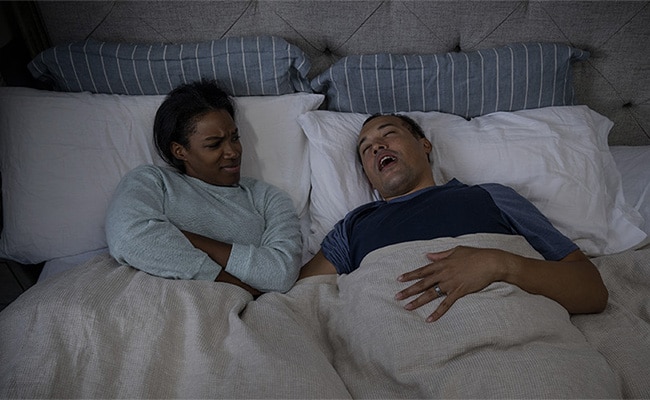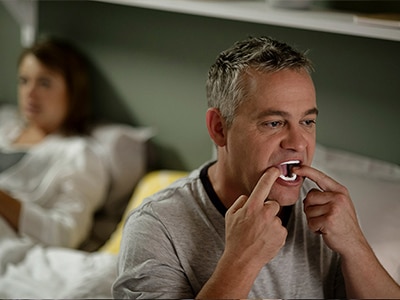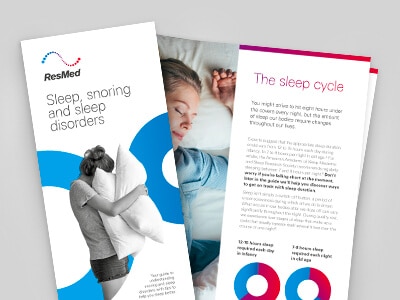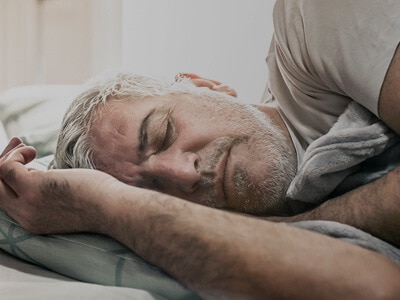What causes snoring?

Is it really possible to ‘cure’ snoring? And if you snore, why is it important to know the reason?
All about snoring
If you snore – especially if you snore loudly – you know how disruptive it can be. You might be embarrassed to fall asleep when you travel or stay with friends. Maybe your partner complains about your snoring and banishes you to the spare room or the sofa. In fact, 95% of snorers say that their snoring bothers their partner.
Fortunately, you’ve come to the right place for help: at ResMed, we’re experts in treating sleep-related breathing issues, including problem snoring.
Why do we snore?
Some people snore because of the shape of their nose or jaw. If you have an enlarged tongue or tonsils or carry excess weight around the neck, you’ll also be prone to snoring. Other factors that can cause you to snore, or snore more loudly, include fatigue, excess weight, pregnancy, sleeping on your back, and drinking alcohol before bed.
When we’re asleep, the muscles in our necks relax. Sometimes, they relax so much that the upper airway partially closes, narrowing the passageway through which air travels to our lungs. This narrowing makes the air vibrate in your throat when you breathe, causing the familiar sound of snoring.

Almost 40% of men snore loudly and often, but they’re not alone.
30% of women snore, too.3
Facts about snoring
Snoring is common
It’s estimated that 40% of the investigated population reported snoring, proportion is age-dependent2
Family and partners lose sleep
95% of snorers say that their snoring bothers their family or partner3
Snoring and commorbities
Snorers are 1.6 times more likely to develop arterial hypertension within four years of beginning to snore4
People who snore may also have sleep apnoea
1 in 3 men and 1 in 5 women who snore could suffer from sleep apnoea5
Snoring is common
It’s estimated that 40% of the investigated population reported snoring, proportion is age-dependent2
Family and partners lose sleep
95% of snorers say that their snoring bothers their family or partner3
Snoring and commorbities
Snorers are 1.6 times more likely to develop arterial hypertension within four years of beginning to snore4
People who snore may also have sleep apnoea
1 in 3 men and 1 in 5 women who snore could suffer from sleep apnoea5
Snoring can also be a sign of a serious medical disorder: obstructive sleep apnoea (OSA)
OSA is a sleep breathing disorder that’s characterised by breathing pauses called apnoeas. These last for 10 to 30 seconds or more and can be repeated more than 30 times per hour. These apnoeas lead to micro-awakenings that disrupt your sleep and affect your quality of life and your health. OSA affects about 3-17% of the male population, but more than 80% of patients are not diagnosed.7
Keep exploring

Treatment for snoring
Dozens of products claim to treat snoring. Our Narval dental device is a clinically proven solution that prevents loud snoring in 89% of patients who use it. Narval is thin, light, discreet and custom-made to fit in your mouth and does not disturb you while you sleep*.6

Sleep, snoring and sleep disorders
Are you getting enough good quality sleep? This guide explores common sleep problems and how to fix them.

What is sleep apnoea?
Many people have sleep apnoea, but may not even know it. In fact, sleep apnoea affects more than 3 in 10 men and nearly 1 in 5 women, so it’s more common than you might think.8
*Please note the Narval CC mandibular advancement device is not available in England, Scotland or Wales.
References:
- A+A Healthcare study undertaken with 95 patients who wore Narval CC (Equinox in France) in 2011.
- Ohayon, M.M., et al., Snoring and breathing pauses during sleep: telephone interview survey of a United Kingdom population sample. BMJ, 1997. 314(7084): p. 860-3.
- A+A Healthcare study undertaken with 95 patients who wore Narval CC (Equinox in France) in 2011.
- Hu, F.B., et al., Prospective study of snoring and risk of hypertension in women. Am J Epidemiol, 1999. 150(8): p. 806-16.
- Lechner, M., et al., Snoring and breathing pauses during sleep: interview survey of a United Kingdom population sample reveals a significant increase in the rates of sleep apnoea and obesity over the last 20 years – data from the UK sleep survey. Sleep Med, 2019. 54: p. 250-256. You can say that 1 in 5 snorers (men or women) could suffer from sleep apnea.
- Vecchierini MF & al. A custom-made mandibular repositioning device for obstructive sleep apnoea-hypopnoea syndrome: the ORCADES study. Sleep Med. 2016 Mar;19:131-40. doi: 10.1016.
- Young T, Evans L, Finn L, Patta M. Estimation of the clinically diagnosed proportion of sleep apnoea syndrome in middle-aged men and women. Sleep 1997; 20: 705-706.
- Sleep-disordered breathing affects 34% of men and 17% of women aged between 30-70 Peppard et al. Increased Prevalence of Sleep-Disordered Breathing in Adults. Am J Epidemiol. 2013 (5.17).